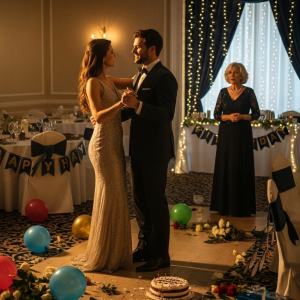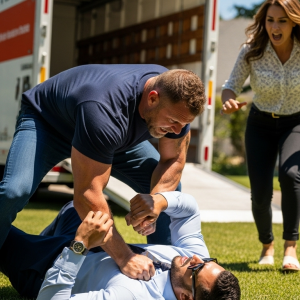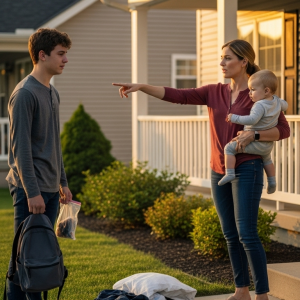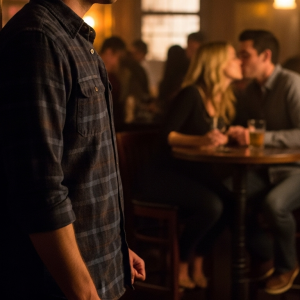The air in my parents’ dining room was a carefully preserved artifact, a perfect specimen of quiet, effortless success. It was the same atmosphere I had breathed in every holiday for twenty-one years.
Polished oak gleamed under the soft, forgiving glow of the chandelier. The heavy, throne-like chairs were tucked into their precise places around the table, a silent testament to order and stability.
From a discreet corner speaker, the low, mellow hum of a jazz trio drifted through the room. It was a soundtrack so familiar it had woven itself into the fabric of my childhood memories.
This room wasn’t just a room; it was a museum dedicated to the portrait of a happy family, and tonight, I was once again playing my part as one of its smiling exhibits.
My mother, Leona, had orchestrated the evening with her usual impeccable grace. Her signature roasted squash, a vibrant mosaic of deep oranges and rich greens, sat like a centerpiece.
Across from me, my father, Dr. Byron Hayes, carved the Thanksgiving turkey with a surgeon’s precision. Each slice was clean, deliberate, and perfect.
The familiar scene, the comforting aroma of rosemary and thyme, the gentle clinking of silverware against fine china—for a fleeting, dangerous moment, I allowed myself to be lulled by it. Huddled in the familiar warmth, I almost convinced myself that things were fine.
That I was fine.
It was a lie, of course. A beautiful, elaborate lie I was telling myself as much as them.
My real life, the one that existed a three-hour drive away in a cramped apartment that always smelled faintly of burnt coffee, was anything but fine. The last semester had been a brutal, relentless grind.
It was a blurry montage of long nights bleeding into even longer days. I had meticulously stacked my schedule, cramming every available hour with a task until not a single blank square remained on my wall calendar. It was a fortress of busyness I had built to keep the panic at bay.
Mornings were for anatomy lab. The sterile scent of formaldehyde clung to my clothes and hair as I hunched over cadavers, tracing the intricate, silent pathways of the human body while my own screamed for rest.
Afternoons were a frantic race across campus for back-to-back tutoring sessions. I would patiently explain biological processes to freshmen for twenty dollars an hour, my mind constantly calculating how many sessions it would take to cover my electricity bill.
The nights were the longest. They were spent on my feet during grueling bar shifts that stretched past two in the morning. The sticky-sweet smell of spilled liquor and the cacophony of slurred conversations felt like a different planet from the quiet ambition of my medical textbooks.
I told myself it was temporary. It became a mantra, a prayer I repeated in the shower, on the bus, in the two minutes of quiet before I fell into a dreamless, exhausted sleep.
Just until I catch up. Just until rent is cleared. Just until I can finally breathe.
Breathing felt like a luxury I couldn’t afford. Most days, breakfast was a memory, a phantom craving for something more than the black coffee I chugged on my way out the door.
Lunch was a chalky protein bar, its wrapper hastily torn open and devoured while walking between campus buildings, the taste of artificial chocolate coating my tongue.
Dinner, when I had the energy to make it, was a block of instant noodles. The salty broth was a poor substitute for real nourishment, but it was hot and it was cheap. More often, it was the day-old pastries the café near my apartment tossed out at closing, their cloying sweetness a reminder of my own deficiencies.
My world was shrinking, fraying at the edges. The soles of my only pair of decent shoes had begun to separate, a gaping mouth that mocked my every step on the cold pavement.
I couldn’t afford new ones. So one night, sitting on my floor under the light of a single bare bulb, armed with a rusty stapler from my desk, I had crudely pinched the leather together. The metal staples were a small, sharp emblem of my desperation.
I had become an artist of pretending, a master of the cheerful façade. My weekly calls home were performances. My voice was always bright, my anecdotes carefully curated to project success and contentment.
“Labs are challenging, but I’m learning so much!”
“Yes, Mom, I’m eating well. Of course, I am.”
“No, I’m getting enough sleep. Don’t worry about me.”
Lies. All of them. Each one was another brick in the wall separating my world from theirs, a wall I feared would soon come crashing down.
My father looked up from his meticulous carving, his smile so genuinely warm it sent a pang of guilt deep into my gut. He gestured with the serving fork, offering me the bowl of creamy mashed potatoes, his eyes crinkling at the corners.
“So,” he began, his voice the epitome of casual, paternal contentment. “Is the two thousand a month we’ve been sending helping out? I know things can get tight for students, even with tuition covered.”
The porcelain fork slipped from my numb fingers. It clattered against the rim of my plate.
The sound was a gunshot in the serene dining room, a sharp, shattering report that echoed in the sudden silence. The jazz music seemed to falter, the saxophone holding a note that wavered and then died completely.
I blinked. The room, the faces, the festive table—it all blurred, as if my eyes couldn’t process the question he’d just asked. My mind raced, stumbling, trying to make sense of the words.
Two thousand a month?
It was an impossible sum, a lifeline I had only dreamed of in my most desperate moments. A number so large it felt like a fantasy.
A sound escaped my lips, barely a whisper.
“What… money?”
A pause. It was no longer a simple silence; it was a heavy, suffocating vacuum that swallowed all the air, all the warmth, all the pretense in the room.
My father’s smile didn’t just drop; it evaporated, erased from his face as if it had never been there. His gaze, sharp and questioning, shot across the table to my mother.
She didn’t flinch, but a subtle, almost imperceptible shift occurred in her posture. She refused to meet his eyes. Her focus became suddenly, intensely fixed on the pristine linen napkin in her lap.
Her hands, adorned with the simple gold wedding band she’d worn for twenty-five years, began to fold and refold the cloth with a frantic, trembling precision. She couldn’t even pretend. She didn’t have to.
Without uttering a single word, she had already confessed everything.
“I… I don’t understand,” I said again, this time finding a sliver of my voice. It was a strained whisper that felt foreign, a sound that didn’t belong amidst the polished gleam of my family’s life. “I haven’t gotten anything.”
My father’s head snapped back toward me, his confusion warring with a new, dark suspicion. “What do you mean, you haven’t gotten anything? Iris, the transfers have been going out on the first of every month. I see the debits.”
Leona finally spoke, her voice sharp and brittle, a clear command to cease and desist. “Byron, this is hardly the time or the place to discuss finances.”
“It seems to me this is the perfect time,” he countered, his voice dangerously low. He placed the carving knife and fork down on the platter with a definitive click, his entire posture shifting from relaxed patriarch to focused interrogator.
He didn’t look at me; his eyes were locked on his wife. “Leona. You told me you would handle the transfers.”
“And I did,” she replied. She finally looked up, her chin tilted in a gesture of pure, unadulterated defiance. Her gaze was not one of guilt, but of righteousness, as if she were the one being wronged.
“To who?” my father’s voice cracked on the single word, the foundation of his trust beginning to crumble. “Because it clearly wasn’t to Iris.”
My mother, a portrait of aggrieved composure, reached for her water glass, though the slight tremor in her hand betrayed the effort it took. She took a slow, deliberate sip before setting it down, the crystal ringing softly against the tabletop.
“Soraya’s program in L.A. is far more expensive than you realize, Byron. She needs the support more.”
Her words were calm, measured, as if explaining a simple, logical decision.
“You know how unforgiving the fashion world is. It’s brutally competitive. She has an image to maintain, connections to make. These things require resources.”
The air left my lungs in a silent rush, as if I’d been punched. She needs it more. The words ricocheted around the cavern of my chest, each syllable a fresh wound.
Soraya, my older sister. Soraya, the artist, the free spirit, the one who lived a sun-drenched, beautifully curated life in Los Angeles—a life she documented daily with a stream of photos from rooftop lounges, exclusive brunch spots, and designer boutiques.
My father stared at her, his face a canvas of disbelief. “And Iris is just supposed to survive on what? Scraps? While our other daughter walks down Rodeo Drive on money meant for her sister?”
His voice was rising now, the tremor of shock hardening into the sharp edge of anger. He held up a hand, cutting her off before she could formulate another defense.
“No. I want to know. For how long has this been going on?”
My mother let out a sigh, a sound of pure, unadulterated exasperation, as if we were two petulant children ruining her perfectly planned evening.
“Since August,” she said, her tone clipped. “When Soraya’s internship ended and she needed to secure a new studio space. She was under enormous pressure.”
He turned back to me, and the raw horror in his eyes was almost too much to bear. It was the look of a man realizing the map he’d been following was a complete fabrication. “Iris… sweetheart… you’ve had nothing? No support at all?”
I could only shake my head, the lie I had been living for months caught in my throat, choking me.
“I asked once,” I finally managed to say, the memory a fresh sting of humiliation. “Back in September. I called and asked if there was any way you could help, just a little. Mom said there wasn’t anything left after tuition was paid.”
I saw the blow land. I saw the understanding crash into him, rearranging his features into a mask of anguish. His shoulders, always so broad and confident, seemed to fall. “But… I thought you were okay. You always said you were doing so well.”
The dam inside me finally broke. The carefully constructed wall of “I’m fine” crumbled into dust, and the raw, unvarnished truth spilled out, tasting like ash in my mouth.
“I’ve been working three jobs,” I said, the words tumbling out, no longer a whisper but a ragged, tearing accusation. “I tutor for cash, I work bar shifts until two in the morning. I’ve been skipping meals to make rent.”
I took a shaky breath, my gaze fixed on my mother’s stony face.
“Two months ago, I collapsed from exhaustion during a shift. I ended up in the emergency room. But sure, Mom. I’m fine.”
My mother’s chair scraped violently against the hardwood floor as she stood, her face flushed with fury. Her napkin was thrown onto the table like a gauntlet.
“Don’t you dare do this here! This is not the forum for such dramatics. It’s Thanksgiving.”
But my father didn’t move. He wasn’t looking at her. He was looking at me, and the look on his face was one of profound, soul-shattering recognition.
It was as if he was seeing me, truly seeing me, for the first time in years. Not the successful, capable daughter from the family portrait, but a stranger. A young woman who had been quietly, desperately drowning right in front of him.
“I need some air,” I choked out, pushing my chair back and standing on legs that felt like they might give way.
The familiar hallway felt alien, its walls closing in. I stumbled toward the front door, my only thought to escape the suffocating weight of that room.
Stepping out into the biting cold of the November night, I clutched the thin fabric of my jacket and, finally, desperately, tried to breathe.
The three-hour drive back to my apartment was a blur of headlights and the monotonous drone of the highway. My car, a decade-old sedan with a persistent rattle, felt like a time machine hurtling me away from the wreckage.
I replayed the scene at the dinner table over and over, each time feeling a fresh wave of sickness and rage. My mother’s defiant expression, my father’s horrified face, the casual cruelty of the words, “She needs it more.”
By the time I unlocked the three deadbolts on my own door, the exhaustion had settled deep into my bones, a cold, heavy thing that had nothing to do with lack of sleep. I didn’t cry. I felt hollowed out, as if the capacity for tears had been scraped clean from me.
Back in that silent, perfectly appointed house, a different kind of storm was raging.
As I later learned, after I left, my father had simply stood up, walked into his study, and closed the door. He didn’t shout, he didn’t argue. The silence was his verdict.
He spent the next two hours online, his fingers flying across the keyboard, his face illuminated by the cold blue light of the monitor. He pulled up the statements for the trust account he had set up for us years ago, the one intended to be split evenly between his two daughters.
And there it was, inarguable and stark in columns of black and white. Monthly transfers of $2,000, not to me, but to a separate account under Soraya’s name. Then another transfer. And another.
His breath caught in his throat. He scrolled back, further and further. It hadn’t just been since August. It had been going on for over a year.
Then he saw the larger withdrawals, the ones that didn’t fit the monthly pattern. Five thousand dollars for a “business retreat” in Aspen. Three thousand for a “networking event” in New York. Funds that coincided perfectly with Soraya’s lavish Instagram posts from ski slopes and rooftop bars.
The evidence was irrefutable. Leona hadn’t just redirected my support; she had been systematically draining the account for the benefit of her favored child.
The rage that filled him then was cold and absolute. It was the rage of a man who realized he’d been made a fool of, but worse, that his trust had been used as a weapon against his own child.
His phone call came the next afternoon. His voice was heavy with a weariness I had never heard from him before.
“Iris. I am so sorry.”
“It’s not your fault,” I said automatically, the ingrained habit of smoothing things over dying hard.
“Stop,” he said, his voice firm but gentle. “Don’t protect me. It is my fault. I trusted her. I didn’t look closer. I didn’t ask you the right questions. I let you down.”
There was a long pause.
“Tell me everything,” he said. “And don’t you dare tell me you’re fine.”
And so I did. I told him everything. I told him about the staples in my shoes, the constant, gnawing hunger, the dizziness during lectures.
I told him about the humiliating trip to the ER, the detached voice of the nurse asking if there was anyone she could call for me, and the lonely silence that followed when I said no. I told him about the shame, the feeling that I was failing when I was working as hard as I possibly could.
I spoke until my throat was raw, and he just listened, his quiet breathing on the other end of the line the only sound.
When I was finished, he said, “I’ve spoken to an attorney. I’m freezing the account. We’re going to get it all back, Iris. I promise you.”
Then his voice broke. “I am so, so sorry.”
That night, the argument I had fled finally happened. My father confronted my mother not with rage, but with the cold, hard evidence from the bank statements. He laid them out on the kitchen island, a paper trail of her betrayal.
“I was investing in our family’s image!” she’d cried, her defiance finally cracking to reveal a desperate, warped logic. “Soraya is the artist, the one with the potential to be famous! Iris is practical. She’s strong. I knew she would manage!”
“Manage?” he had shot back, his voice low and cutting. “She collapsed at work, Leona. She ended up in the hospital. Is that your definition of managing?”
“I was protecting Soraya from the humiliation of failure!”
“You weren’t protecting her,” my father’s voice was like ice. “You were indulging her. And you were abandoning our other daughter. You lied to me, Leona. For years. You made me complicit in her suffering.”
The final, decisive call came from Soraya two days later. Her voice was as breezy and self-assured as ever.
“Hey! Mom said Thanksgiving was a total bust. What was that all about?”
“You should ask her,” I said, my voice flat.
“Whatever. Listen, this is so weird, but the monthly transfer didn’t come through. Can you ask Dad to check on it? I have a deposit due on a new handbag, and it’s limited edition.”
I almost laughed. It was so absurd, so perfectly, obliviously Soraya.
“There are no more transfers, Soraya.”
“What do you mean? Mom handles it.”
“Yes, she does. She’s been handling it by taking my half of the trust fund and giving it to you for the past year and a half.”
There was a beat of silence on the other end of the line. But it wasn’t the silence of remorse. It was the silence of indignation.
“Well, that’s not my fault. I didn’t know the specifics. It’s not my problem you’re not as ambitious. My career requires a certain lifestyle.”
“My education requires that I eat,” I said, and hung up the phone.
My father was a man of his word. Action followed his promise with swift, unwavering efficiency.
The first thing that appeared in my bank account was a wire transfer for fifty thousand dollars. The memo line simply read: “A start. I love you.”
I stared at the number on my screen for a full ten minutes, feeling a wave of relief so profound it made my knees weak. It was more money than I had ever seen in my life.
The attorney he’d hired was ruthless and effective. A process was initiated to freeze the trust and begin the slow, methodical work of reversing the transactions from Soraya’s account. It would be a long fight, he warned me, but it was a fight he intended to win.
But it was more than the money. Dad started calling every other day, not to check up on me, but just to talk. He asked about my classes, my friends, the mundane details of my life he had missed for so long.
He listened. He truly listened.
During one of our calls, he said, “I was looking at rentals online. I found a great apartment two blocks from your campus. Better security, a real kitchen, a bedroom with a window that gets morning sun. I’ve paid the deposit and the first six months. The keys are waiting for you.”
For the first time in years, I felt the crushing weight on my chest begin to lift.
I moved into the new apartment. I bought new shoes—two pairs, one for running and one for simply walking without pain. I filled the new refrigerator with fresh vegetables, fruit, and real food that didn’t come in a plastic cup.
I quit my job at the bar entirely. I dropped my tutoring gig. And I studied.
With a clear head, a full stomach, and a quiet home, my grades didn’t just stabilize; they soared. The relief was so profound it was almost painful. I hadn’t realized how close to the edge I had been until I was finally able to step back from it.
The holidays approached with a sense of dread. The thought of returning to that house, that dining room, was unbearable.
“You don’t have to come,” Dad said during one of our calls. “No one will blame you. I’ll come to you if you’d like.”
But I knew I had to go. Not for my mother, and not even for him, but for me. I needed to close the chapter, to face the ghosts in that museum of a house.
Christmas was a quiet, strained affair. My mother had filed for a legal separation, and my father had moved into the guesthouse. The main house felt cavernous and cold, stripped of its usual festive cheer.
Soraya was there, flown in from L.A. She looked smaller, less vibrant without her usual designer armor. Her eyes were puffy, and she avoided my gaze, her usual breezy confidence replaced by a sullen, resentful silence. She had been forced to get a roommate and a part-time job at a clothing store.
We didn’t sit in the dining room. We ate in the kitchen, a meal of takeout served on everyday plates. The silence was thick with unspoken words. It wasn’t a happy reunion. It was a fragile, painful truce.
After dinner, my father found me in the living room, looking at the old family portraits on the mantle. The smiling faces in the silver frames seemed to belong to another family from another lifetime.
“It will never be the same,” he said quietly, standing beside me.
“It was never what we thought it was,” I replied, my voice steady.
He nodded, a deep sadness in his eyes. “I know. But maybe… we can build something new. Something real this time.”
He placed a hand on my shoulder, his touch warm and steady.
“Starting now.”
It wasn’t forgiveness, not yet. And it wasn’t a neat, happy ending wrapped in a bow. But standing there with my father, in the ruins of the family we once thought we had, it felt like a foundation.




